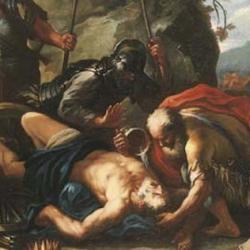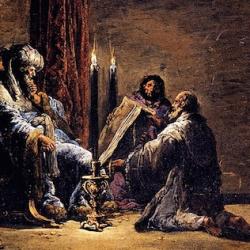In his commentary on Chronicles, Mark Boda notes that joy is a key theme in Chronicles. Commenting on 2 Chronicles 7:10, he observes that “proper attention to worship legislation is not seen as dutiful drudgery, but rather joyous celebration” (271). The passages he cites fill out the role of joy in the life of Israel.
- 1 Chronicles 12:40: Warriors and leaders gather in Hebron to make David king, A caravan from Issachar, Zebulun and Naphtali brings flour, figs, raisins, wine, oil, oxen, and sheep and “there was joy in Israel.” Israel rejoices that a new king has ascended the throne.
- 1 Chronicles 15:16, 25: David appoints Levites as singers and musicians so they can raise “sounds of joy” (v. 16). As they carry the ark of Yahweh into Jerusalem, the elders and captains are filled with joy (v. 25). Israel rejoices that Yahweh’s throne is entering the chosen city.
- 1 Chronicles 29:9, 17, 22: An assembly to transfer the throne from David to Solomon, and to make formal arrangements for the temple. When David calls for the people to donate to the temple, they give large amounts of gold, silver, brass, iron, and precious stones, and then rejoice at their own generosity (v. 9). David confesses his own joy at the votive offerings of the people in a prayer (v. 17). The event climaxes with sacrifices and ascension offerings and a great feast: “so they ate and drank that day before Yahweh with great gladness” (v. 22). Again, a political occasion—making Solomon king “a second time”—is cause for rejoicing.
- 2 Chronicles 6:41: Solomon concludes his prayer of temple dedication with a request that the Lord take His resting place on the ark of might, so that priests would be clothed with salvation and godly ones could rejoice in what is good.
- 2 Chronicles 15:15: During the reign of Asa, Zerah the Ethiopian attacks and the Lord routs the gigantic Ethiopian army (14:9-12). In the Spirit, Azariah prophesies that the Lord won’t forsake Israel (15:1-7), and Asa responds by removing idols and restoring the altar of Yahweh (15:8). He gathers Judah and Benjamin for a feast of rededication to Yahweh. They take an oath “with their whole heart” (15:15); having sought Yahweh, He let them find Him, and they rejoice in the oath, in Yahweh’s presence, and in the rest that Yahweh gives.
- 2 Chronicles 20:27: Judah is again threatened in the reign of Jehoshaphat, this time by Moab, Ammon, and the Meunites. The king seeks the Lord (20:4), and the Spirit inspires another prophet, Jahaziel, to assure them of victory (20:14-17). The Levites sing and play instruments, and the Lord routs the Arameans. After they go out to the wilderness to survey the corpses, they return to Jerusalem “with joy, for Yahweh had made them to rejoice over their enemies” (v. 27). The relief of military victory brings joy.
- 2 Chronicles 23:13, 18, 21: Athaliah is on the throne, and the Davidic heir, Joash, is hidden away in the temple. When he turns seven, Jehoiada the priest brings him out to the king’s pillar to make him king. “All the people of the land rejoiced and blew trumpets” that the rightful king was taking the throne (v. 13). Jehoiada leads the people in covenant renewal, reinstalling the priests and Levites to praise “with rejoicing and singing according to the order of David” (v. 18). When the drama is over and Athaliah removed, “all the people of the land rejoiced and the city was quiet” (v. 18).
- 2 Chronicles 24:10: To pay for maintenance and repair of the house of Yahweh, Joash installs a collection box at the gate of the temple and orders them to donate the temple tax that Moses required (vv. 8-9). The people rejoice and bring the levy; joy here seems to be the motivation for generosity.
- 2 Chronicles 29:30, 36: Hezekiah cleanses and restores the temple, reestablishing the Levites to sing “praises with joy” (v. 30). A restoration of Davidic/Solomonic order brings Davidic/Solomonic joy. There is a massive feast; because there are too many ascension offerings for the priests to handle, Levites are consecrated to assist them (v. 34). The surprise of Judah’s sudden turn-around astonishes the people: “all the people rejoiced over what God had prepared for the people, because the thing came about suddenly” (v. 36).
- 2 Chronicles 30:21, 23, 25–26: A continuation of the account of Hezekiah’s reign. The sons of Israel celebrate Unleavened Bread with joy (v. 21), rejoicing through the seven-day feast (v. 23). The Chronicler piles it on: “All the assembly of Judah rejoiced . . . so there was great joy in Jerusalem, because there was nothing like this in Jerusalem since the days of Solomon the son of David” (vv. 25-26). Hezekiah marks the high point, and the final moment in the Chronicler’s history of joy. After 2 Chronicles 30, there is no joy, gladness, or rejoicing in Judah.
In sum: Joy in Chronicles is communal and political. It is the emotional response of the people to rest, safety, right order, all of which depend on having a king and ultimately on Yahweh’s own presence.











